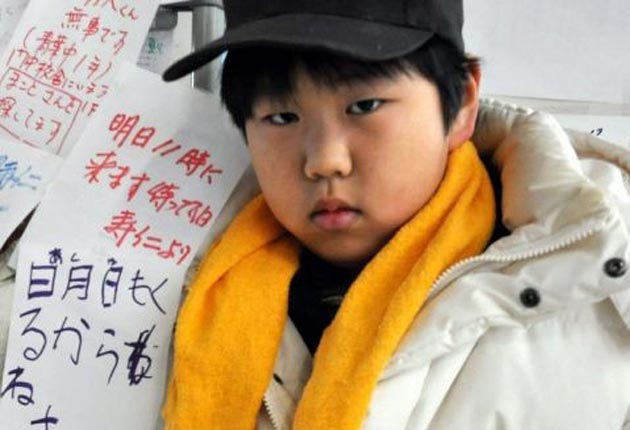The lonely vigil of children who lost mum and dad
Tragic Toshihito, nine, is one of thousands of youngsters looking for their parents

The nine-year-old boy stares at the camera, his haunted eyes contrasting with the chubby cheeks and warm clothes that speak of a childhood of love and comfort. But now Toshihito Aisawa is on a lone vigil, travelling from one shelter to the next searching for the family he last saw being engulfed by Japan's tsunami.
In his hands are signs scrawled in colourful marker pen. One has the names of his mother, father, grandmother and two cousins, who are missing since the black waves swallowed swathes of coastline. Another simply reads: "I will come again tomorrow."
Up to 10,000 children have been left homeless by the earthquake and tsunami, Save the Children reports. Many are struggling in freezing temperatures without adequate food, shelter and warmth.
No one knows how many orphans have been left behind, with the devastation and radiation levels hampering rescue and relief operations.
It was Toshihito's strength and courage which helped him survive. Soon after the earthquake struck, his father rushed to the local school to drive the boy and his family to higher ground. But they were too late. The wave bore down on the packed car and the debris slammed against the windows as seawater gushed in.
Toshihito somehow managed to smash the glass with his small fists. He grasped the hand of one of his younger cousins and crawled out.
But the force of the wave was too much. "Something, probably a tree, came crashing through, and I had to let go," Toshihito told the Japanese newspaper Asahi Shimbun.
The last thing he remembers are his cousin and grandmother calling for help, their voices fading. He passed out and somehow survived, fished out of the water by an unknown saviour.
Now, he is being looked after by a local barbershop owner, who worries about the boy's tireless search of the packed evacuation centres of Ishinomaki city. But Toshihito will not give up. "When the roads clear up, I'm going to check our home," he says.
He elicits sympathetic glances at the shelter, but no one can help. Toshihito is one of thousands of frustrated people whose daily ritual now involves scouring the long lists of the dead with trepidation, the lists of the survivors with hope, and wondering just when their government is going to help ease their agonising task.
Charitable groups are doing what they can, but conditions are challenging. "We travelled for 10 hours in snow, sleet, rain and sludge," said Ian Woolverton, who led a mission from Save the Children into towns north of Sendai.
"There were some terrible scenes. In some places, like Onagawa, there was nothing left. In others, like Ishinomaki, we found children in evacuation centres huddled around kerosene lamps."
While the children have to deal with the immediate physical and psychological traumas, there is also the spectre of the nuclear power plant smouldering nearby.
Even the youngsters are aware of the shadow it could cast over their future and are wary of playing outside.
"We know about the bombs at Hiroshima and Nagasaki and we are very scared. It makes us really worry. If it explodes, it is going to be terrible," 10-year-old Yasu Hiro told Save the Children.
Join our commenting forum
Join thought-provoking conversations, follow other Independent readers and see their replies
Comments